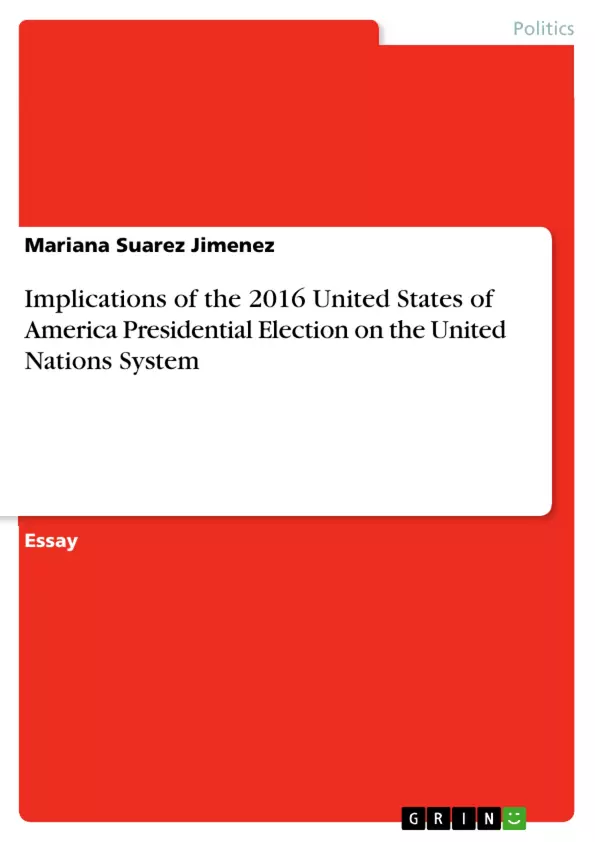The United Nations is notorious for its stringent modalities. Many critics argue that the UN is an inefficient, inflexible, costly and corrupt bureaucratic body that will be plagued with its short comings for as long as politics exist.
In 2016 the world experienced many unpredicted events, Brexit, the failed plebiscite in Colombia, impeachment of South Korean President inter alia. These events all seem connected by the populous retaliating against the elites, their failures or an outright loss of faith in institution.
The 2016 United States Presidential Elections were no different; shocking the world over. Bilateral relationships are projected to falter; Mexico for example has no intention of building its own prison, or strengthen; Russian leader Vladimir Putin has expressed his willingness to cooperate with the billionaire president elect. Multilateral agreements such as the TPP are set to crumble. The Human Rights of Women, Immigrants and detainees will no longer be staples of the leader of the free world, prompting other nations to follow suit of indifference. Will this tectonic shift in the hegemons domestic politics rattle the United Nations?
This paper will begin with a brief description of the US Election; expanding on why many fear the succeeding US incumbent and the influence that the US president has on foreign policy. Subsequently, a description of the UN system will give insight into its structure and debilities, each prong of the system will then be analysed in light of how its will be affected by the US 2016 Election. Will this event have any effect at all or will it be ‘business as usual’ in the realm of international affairs? Does it take a bull in a china shop to catalyse institutional UN reform?
Inhaltsverzeichnis (Table of Contents)
- Introduction
- Trump is precarious?
- The UN System
- The Trump effect on Peripheral bodies
- Trump effect on the General Assembly
- Trump effect on the Security Council
- A catalyst for UN evolution?
- Conclusion
Zielsetzung und Themenschwerpunkte (Objectives and Key Themes)
This paper examines the potential implications of the 2016 United States Presidential Election on the United Nations system. It explores the potential impact of Donald Trump's presidency on various aspects of the UN, including its peripheral bodies, the General Assembly, and the Security Council. The paper also considers whether Trump's presidency could act as a catalyst for UN reform.
- The impact of Trump's presidency on US foreign policy
- The structure and weaknesses of the UN system
- The potential effects of Trump's policies on the UN's peripheral bodies, General Assembly, and Security Council
- The possibility of Trump's presidency prompting UN reform
- The implications of Trump's views on climate change and human rights for the UN
Zusammenfassung der Kapitel (Chapter Summaries)
The introduction sets the context for the paper by discussing the 2016 US Presidential Election and its potential impact on the UN system. It highlights the unprecedented nature of Trump's victory and the global shockwaves it has sent. The introduction also emphasizes the importance of understanding the US president's influence on foreign policy.
The chapter titled "Trump is precarious?" delves into Trump's foreign policy pronouncements and their implications for the UN. It analyzes his positions on various issues, including the Middle East, Europe, Mexico, nuclear policy, and climate change. The chapter also examines Trump's potential impact on US relations with China and Taiwan.
The chapter titled "The UN System" provides an overview of the UN's structure and its weaknesses. It explores the different organs of the UN and how they function. The chapter also discusses the challenges facing the UN, such as its bureaucracy, inefficiency, and lack of enforcement power.
Schlüsselwörter (Keywords)
The key terms and concepts explored in this paper include the United States Presidential Election, Donald Trump, US foreign policy, the United Nations system, the UN Security Council, the UN General Assembly, climate change, human rights, and multilateralism.
Frequently Asked Questions
How did the 2016 US Election affect the United Nations?
The election of Donald Trump caused a tectonic shift in international relations, challenging multilateral agreements and prompting concerns about US funding and commitment to UN goals.
What is Donald Trump's stance on UN climate change policies?
Trump expressed skepticism toward climate change agreements, leading to fears that the US would withdraw from global environmental commitments like the Paris Agreement.
Could the 2016 election catalyze UN reform?
Some analysts argue that Trump's "bull in a china shop" approach to foreign policy could force the UN to address long-standing issues of inefficiency and bureaucracy.
How does the US President influence the UN Security Council?
As a permanent member with veto power, the US's foreign policy shifts under a new president can significantly alter the Security Council's ability to act on global conflicts.
What are the main criticisms of the UN system mentioned?
Critics often describe the UN as an inflexible, costly, and sometimes corrupt bureaucratic body that struggles to enforce its own mandates.
- Arbeit zitieren
- Mariana Suarez Jimenez (Autor:in), 2016, Implications of the 2016 United States of America Presidential Election on the United Nations System, München, GRIN Verlag, https://www.grin.com/document/350538



